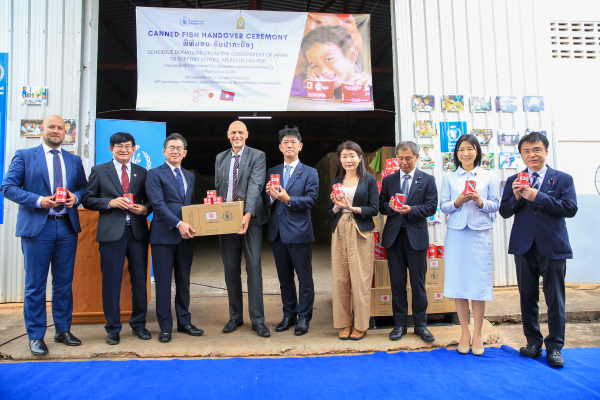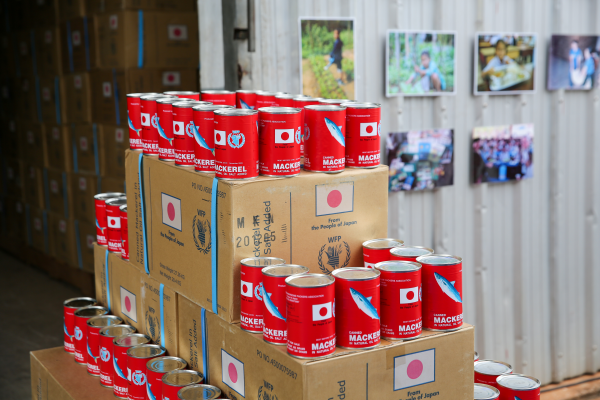KPL
(KPL) Japanese government has donated 32 cargo containers of canned fish to1,423 primary schools in Laos via the Ministry of Education and Sports.

(KPL) Japanese government has donated 32 cargo containers of canned fish to1,423 primary schools in Laos via the Ministry of Education and Sports.
The aid package was handed over by Japanese Ambassador Kenichi Kobayashi ntainers of canned fish to Minister of Education and Sports Assoc. Prof.Dr.PhoutSimmalavong at the World Food Programme’s (WFP) warehouse in Vientiane Sept 8.
132,450 students in 1,423 primary schools around Lao PDR will enjoy healthy lunches prepared with Japanese mackerel and sardines contained in the cans.
As a long-term partner of WFP and Lao PDR, Japan is not only supporting school meals, but has also helped communities recover from disasters such as floods with rice donations, as well as built long-term resilience
through creating community rice banks and other local infrastructure.
The recently donated 402 metric tons of canned fish are worth approx. USD 3,6 million and will help the Ministry of Education and Sports solidify their national school meals programme in 31 districts and eight provinces by supplementing the Government’s budget for school meals. The official programme, introduced in 2010, has since expanded and developed, with support from many actors, including the World Bank, Catholic Relief Services and WFP.
_WFPWH_Lee%20Sipaseuth_2022090810.jpg)
School meals play an important role in ensuring equal access to education, as well as good health and nutrition of schoolchildren, thereby contributing to Lao PDR’s overall human capital development. As a committed partner of the Ministry of Education and Sports in the area of school meals since the year 2000, WFP continues to strengthen the national school meals programme. Support to schools includes installation of safe water, sanitation and hygiene facilities, helping communities to build dining rooms, storage facilities and kitchens, setting up school gardens, community green houses and fishponds, as well as running literacy activities. Japanese funds are currently being used for ensuring sustainability of the national school meals programme by training government staff on all levels, as well as village communities to successfully run and monitor the programme and to contribute to it with labour and agricultural products.
“School meals enhance enrollment rates and help our children stay in school longer. Investing in children’s nutrition, health and education helps them to become productive adults and breaks the cycle of malnutrition. With the help of healthy meals, families and communities start to see the benefits of school, which helps to reduce poverty in the long term,” Assoc. Prof. Dr. PhoutSimmalavong, Minister of Education and Sports said.

“Food security is continuously important in Lao PDR. Improving nutrition especially for children is crucial in a sense that it helps ensure the younger generation’s health and access to basic education, which contributes to improving the human capacity for the future development of Lao PDR. Japan, as a strategic partner, will continue to support the Lao PDR in related fields such as food aid, agriculture and education, in cooperation with international organizations such as the World Food Programme,” Ambassador of Japan to Lao PDR, Kenichi Kobayashi said.
The handover ceremony was witnessed by a delegation of parliamentarians from Japan on a visit to Lao PDR, led by Masahiro Komura, former Vice Minister of Finance and a Member of the House of Councillors. The delegation will have the opportunity of visiting a school in Salavan Province, to witness how a school can become a hub of community development with the help of school meals and their related infrastructure.
“We from WFP are putting our dedication and effort in developing schools around Lao PDR to improve the health and nutrition of children,” said Jan Delbaere, WFP Country Director and Representative. “But, besides the increased enrolment, attendance and better learning results of the children, we also believe in the ripple effect of school meals, such as their potential to lift families out of poverty by creating income generating opportunities for communities. With support from the Government of Japan and our long-standing collaboration with the Ministry of Education and Sports, we are able to advance this agenda step by step.”
KPL